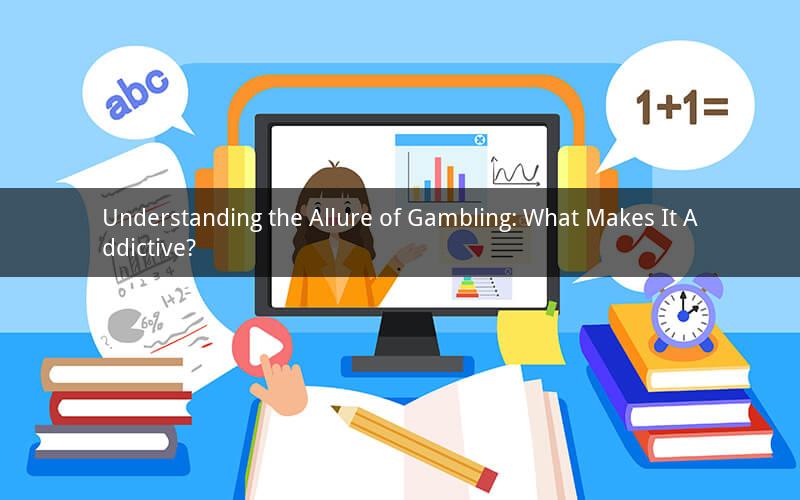
Introduction:
Gambling has been a popular form of entertainment for centuries, captivating individuals from all walks of life. However, for some, it can lead to addiction, causing significant harm to their personal, financial, and social well-being. This article delves into the factors that contribute to gambling addiction, shedding light on the complex psychological and environmental aspects that make it so compelling.
1. The Psychology of Reward:
One of the primary reasons why gambling can be addictive is the psychological aspect of reward. The human brain is wired to seek pleasure and avoid pain. When individuals engage in gambling, the brain releases dopamine, a neurotransmitter associated with pleasure and reward. The anticipation of winning and the subsequent release of dopamine create a sense of excitement and euphoria. Over time, this can create a strong association between gambling and pleasure, making it difficult for individuals to resist the urge to continue playing.
2. The Thrill of Risk:
Gambling inherently involves risk, and the thrill of potentially winning big can be highly addictive. The unpredictability of the outcome keeps individuals engaged and on the edge of their seats. The risk-reward ratio in gambling can be manipulated to create an irresistible allure. The prospect of a high payoff, even with a low probability of winning, can override an individual's judgment and lead to compulsive behavior.
3. Social and Environmental Influences:
Social and environmental factors play a crucial role in the development of gambling addiction. For many individuals, gambling becomes a way to unwind, relieve stress, or seek social interaction. Casinos, online gambling platforms, and gambling advertisements often create an atmosphere that is designed to be inviting and enticing. The presence of other gamblers, the sounds of slot machines, and the bright lights can all contribute to an immersive experience that reinforces the desire to keep playing.
4. Emotional Regulation:
Gambling can be a coping mechanism for individuals who struggle with emotional regulation. Stress, anxiety, and boredom can trigger the urge to gamble as a way to escape reality or alleviate negative emotions. The act of gambling can provide a temporary distraction and a sense of control, making it a coping strategy for those who are vulnerable to addiction.
5. The Role of Genetics:
Research suggests that genetics play a role in the susceptibility to gambling addiction. Studies have found that individuals with a family history of gambling addiction or other substance-related disorders are more likely to develop gambling problems themselves. This suggests that certain genetic predispositions can make individuals more susceptible to the allure of gambling.
5 Questions and Answers:
Question 1: Can anyone become addicted to gambling?
Answer: While anyone can potentially develop a gambling addiction, certain factors, such as genetics, environmental influences, and psychological vulnerabilities, can increase the risk.
Question 2: Is it possible to overcome a gambling addiction?
Answer: Yes, it is possible to overcome a gambling addiction. Many individuals have successfully recovered through various treatment approaches, including therapy, support groups, and lifestyle changes.
Question 3: Can online gambling be more addictive than traditional gambling?
Answer: Online gambling can be more addictive due to its convenience and accessibility. The ability to gamble from the comfort of one's own home can make it easier to develop a compulsive behavior.
Question 4: Are there any effective treatments for gambling addiction?
Answer: Yes, there are several effective treatments for gambling addiction. These include cognitive-behavioral therapy, medication, support groups, and financial counseling.
Question 5: How can individuals prevent gambling addiction?
Answer: Individuals can prevent gambling addiction by setting limits on their gambling activities, avoiding risky environments, seeking support from friends and family, and addressing any underlying emotional or psychological issues that may contribute to the problem.
Conclusion:
Gambling addiction is a complex issue influenced by various psychological, social, and environmental factors. Understanding the allure of gambling can help individuals recognize the signs of addiction and seek appropriate help. By addressing the underlying causes and adopting healthy coping mechanisms, individuals can break free from the grip of gambling addiction and lead fulfilling lives.